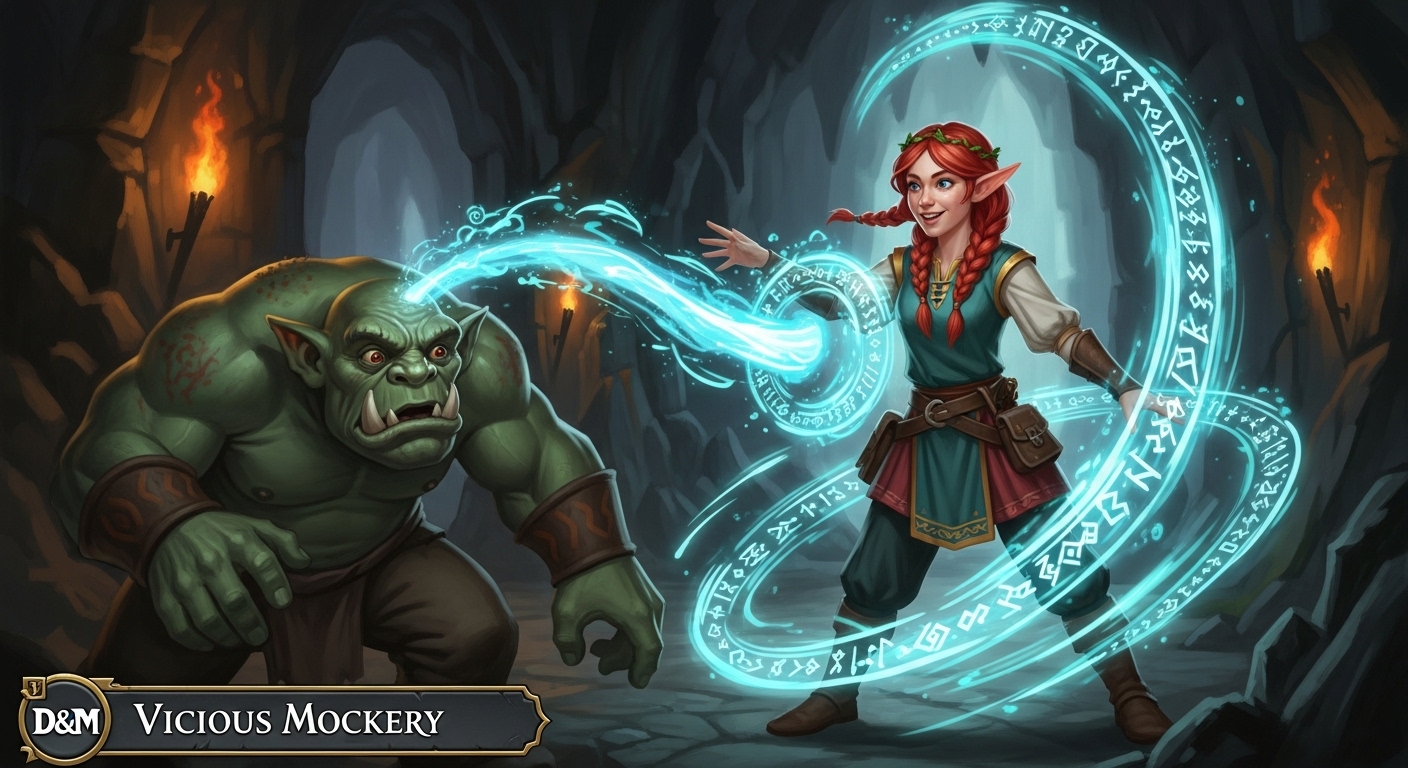Vicious Mockery

- Level: Cantrip
- School: Enchantment
- Class: Bard
- Casting Time: Action
- Range: 60 feet
- Components: V
- Duration: Instantaneous
You unleash a string of insults laced with subtle enchantments at one creature you can see or hear within range. The target must succeed on a Wisdom saving throw or take 1d6 Psychic damage and have Disadvantage on the next attack roll it makes before the end of its next turn.
Cantrip Upgrade. The damage increases by 1d6 when you reach levels 5 (2d6), 11 (3d6), and 17 (4d6).
Tactical Usage
Damage with Debuff Combination. Vicious Mockery provides reliable psychic damage while imposing disadvantage on enemy attacks.
Bard Combat Cantrip. The spell gives bards a consistent combat option that scales throughout character progression.
Verbal-Only Casting. The lack of somatic components enables casting while restrained or holding items.
Spell Combinations
Control Enhancement. Combining with other debuff magic creates comprehensive enemy action disruption.
Damage Coordination. Using alongside other damage spells maximizes offensive output while maintaining utility.
Social Magic Integration. Pairing with other enchantment magic reinforces bard themes and capabilities.
Material Component Details
Verbal Component Only. The spell requires only spoken insults, making it accessible without hand gestures or materials.
Enchanted Insult Power. The verbal component weaves magical compulsion into cutting verbal attacks.
Social Combat Magic. The casting represents weaponizing social interaction through magical enhancement.
Creator Notes
Bard Identity Magic. Vicious Mockery perfectly captures bard combat style through magical verbal attacks.
Unique Damage Type. The psychic damage type provides tactical value against creatures resistant to physical damage.
Scaling Cantrip Balance. The damage progression maintains effectiveness while the debuff provides consistent utility.
Environmental Interactions
60-Foot Range Advantage. The substantial range enables safe casting from behind cover or at distance.
Hearing/Sight Requirements. The target must be able to see or hear the caster for the spell to function.
Language Independence. The magical nature transcends language barriers for universal effectiveness.
Common Rulings & Clarifications
Attack Roll Timing. The disadvantage affects the next attack roll the target makes before its next turn ends.
Damage Scaling. The psychic damage increases by 1d6 at levels 5, 11, and 17.
Save Success Effects. Successful saves negate both damage and the disadvantage effect completely.
Target Requirements. The caster must be able to see or hear the target within range.
Alternative Applications
Social Intimidation. Using magical insults to demonstrate supernatural persuasive power during social encounters.
Crowd Control. Disrupting enemy spellcasters or dangerous attackers through targeted verbal abuse.
Performance Art. Incorporating the spell into bardic performances for entertainment or artistic expression.
Related Spells
Bard Cantrip Options. Various cantrips provide bard combat abilities, while Vicious Mockery offers unique debuff utility.
Enchantment Combat Magic. The spell represents combat-focused enchantment magic through mental manipulation.
Psychic Damage Sources. The spell provides reliable psychic damage access for characters lacking other options.
Scaling Analysis
Cantrip Damage Progression. The spell maintains competitive damage scaling compared to other combat cantrips.
Consistent Utility Value. The disadvantage effect remains tactically valuable regardless of character level.
Bard Combat Cornerstone. The spell provides excellent foundation for bard combat strategies throughout progression.
Narrative Flavor
Magically Enhanced Insults. The mockery should emphasize cutting verbal attacks enhanced with supernatural compulsion.
Psychic Assault Manifestation. The damage should appear as mental anguish rather than physical injury.
Bardic Performance Integration. The casting should reflect the bard's natural charisma and verbal prowess weaponized through magic.